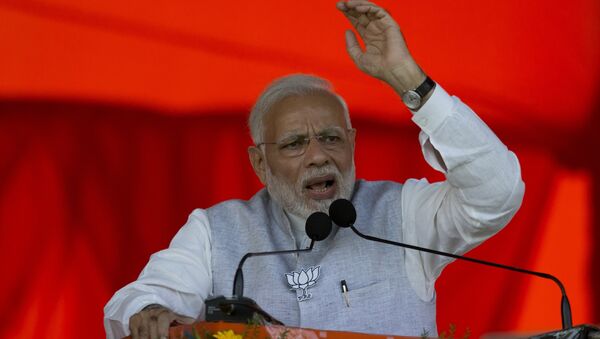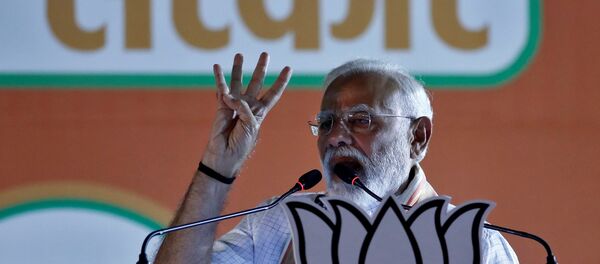Sputnik: Given the large size of the Indian electorate, with almost 900 million of eligible voters, what difficulties might be encountered in the counting of the votes?
Shivam Shankar Singh: The counting of votes since Electronic Voting Machines (EVMs) were introduced isn't as major an operation [as it was once was]. The machines display exactly how many votes each of the candidates received, so there isn't any manual counting of slips. The result totalling exercise is also easy because of this.
So manual counting will be required for less than 30,000 votes when India's Parliamentary Constituencies have over 1.6 million voters each. This process does add to the complexity slightly, but is integral as several questions have been raised over the security of EVMs and if they could be hacked to favour a certain party.
READ MORE: Pakistani FM Mocks Indian PM Modi Over Radar-Evading Cloud Theory
Sputnik: The Bharatiya Janata Party (BJP) lost power in the Hindi-speaking states of Chhattisgarh, Madhya Pradesh and Rajasthan in December's regional elections. How do you assess the BJP's chances in these states in the current general elections?
Shivam Shankar Singh: Since the BJP won all seats in Rajasthan (25/25), 10/11 in Chattisgarh and 27/29 in Madhya Pradesh during the 2014 elections, which is an unprecedented feat, it is sure to lose seats in this election.
The Congress controls the state government in all three of these states, the anti-incumbency now works against the present BJP government that's failed to deliver on jobs, farmers crisis and handle the economy to meet people's expectations and the persona of PM Narendra Modi has also taken a beating as can be seen from his campaigns shift in focus to nationalism and religious sentiments instead of development.
With this combination of factors, these three states will prove to be a major roadblock to the BJP's chances of getting a majority in these elections.
Sputnik: The most important state for election participants is Uttar Pradesh, with a population of 200 million people and where the battle for 80 parliamentary seats will take place. In your opinion, which party will be most successful in this region?
Shivam Shankar Singh: The BJP is losing seats in many states, but the only state that can prevent it from forming the next government is Uttar Pradesh. This is where analysts expect a major chunk of the BJP's losses to come from.
Though there seems to be a strategic understanding between the SP-BSP coalition and the Congress party where Congress has fielded candidates that'll harm BJP's chances and help the coalition, there are fears that the opposition votes will split due to this three cornered contest, helping the BJP. Even with this factored in though, BJP is sure to lose a sizable number of seats in Uttar Pradesh to the SP-BSP coalition.
Sputnik: Yogi Adityanath, chief minister of Uttar Pradesh, said that a victory for the opposition Indian National Congress (INC) in the parliamentary elections will lead to increased separatism and terrorist activity in the country. Do you agree with this statement?
Shivam Shankar Singh: Of course not. The country was doing better under the INC as per most economic indicators and it has been Congress-led governments under which most people have been lifted out of poverty in India.
Every government in India has always maintained a focus on curbing terrorism and separatism, and it hasn't been something any one party can claim to be better at. Neither are these things as political as they are being made out to be.
Indian defence forces and our administration has worked to counter terrorism and separatism no matter what party is in power, and politicians claiming credit for such things is nothing but them trying to further their own politics.
READ MORE: Pakistan Redeploys F-16 Warplanes After ‘its Failure to Counter India' — Report
The way I see it all such statements are electoral strategy to get people to talk about nationalists pride, religion and security rather than focus on the core areas in which the BJP government has failed — that of unemployment, farmers, the economy, developing villages, education and failed initiatives like Make in India, Startup India, SAGY etc.
Sputnik: Talking to reporters, Pakistani Prime Minister Imran Khan said that there is "better chance of peace" with India if the BJP wins the general elections. In your view, why is the Pakistani establishment favouring the BJP?
Shivam Shankar Singh: In my view they aren't favouring the BJP. As part of its strategy BJP always portrayed how Congress was close to Pakistan in order to consolidate its core support base. With just one statement Imran Khan put a spanner in the BJP's narrative.
The Pakistani PM has also been good at improving his international image by releasing the captured Indian pilot and by claiming that Pakistan wants peace but that there is chance of aggression from India's side in order to win elections. In my view it isn't out of any grand strategy that such a statement was made, and it seems to have been made only to cause minor annoyance to PM Narendra Modi. Such a statement surely doesn't help the BJP electorally in India.
Sputnik: How will Pak-Indian relations, especially regarding the settlement of the Kashmir territorial dispute, develop in both cases (if the BJP or the INC win the election)?
Shivam Shankar Singh: The Kashmir dispute is a complex subject that has been a topic of discussions and conflicts between the two countries since independence. By most assessments the situation has deteriorated for Kashmiris in the last 5 years and the relationship between the two nations has also worsened since the Pulwama terrorist attack.
In light of this, it is likely to take decades for the Kashmir conflict to get resolved and which party forms the government is unlikely to have lasting impact on the issue. The domestic situation in Kashmir though does need to be addressed with caution as sentiments in the valley have worsened due to the poll narrative BJP is trying to frame to get votes from the North Indian states.
The views and opinions expressed in the article are those of the speaker and do not necessarily reflect those of Sputnik.






